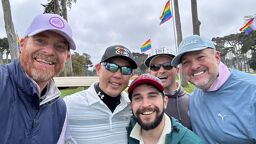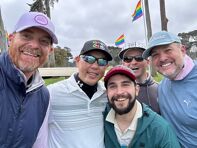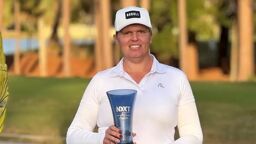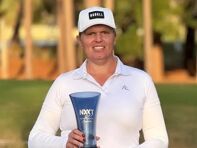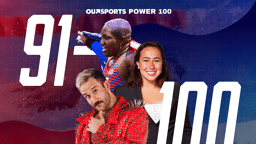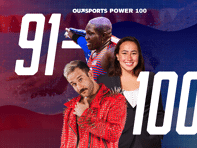The Masters is the most iconic weekend in golf, and with Tiger Woods competing it’s times-10. Played every year at Augusta National in Georgia it is, as Jim Nantz says, “a tradition like no other.”
Like every other Masters before it, this one will take place with no out LGBTQ athletes. In fact, there’s been only one golfer ever to play on the PGA Tour — Tadd Fujikawa — to come out as gay.
We’ve had an out player in the NFL Playoffs and the NBA Playoffs. We’ve had an out gay player win the MLS Cup. We’ve had out athletes win numerous Olympic medals. Out women in virtually every sport have earned the highest of honors.
Yet an out athlete has never competed on the PGA Tour, let alone the Masters.
There have been various women to come out publicly in women’s professional golf. The men? Zero.
Fujikawa — who’s now a pickleball coach in Georgia — said one of the fastest ways to change that fact would be for a stream of players at the Masters and on the PGA Tour to talk about their acceptance of LGBTQ people, and their friends and family members who are part of the community.
“If the players on the PGA Tour were more outspoken about it, it would help our cause a lot,” Fujikawa told Outsports. “But I think a lot of the players feel that it doesn’t really involve them, so being quiet is OK. I think a lot of them probably don’t care if someone is gay, but if we don’t talk about it the issue it doesn’t get resolved.”
One golf pro who wasn’t shy about waving a rainbow at a tournament is Collin Morikawa, who last year used a rainbow-colored yardage book during the PGA Tour’s Memorial Tournament.
Yet Fujikawa’s observation is spot-on: Very few male professional golfers over the years have made any public gestures of support for the LGBTQ community. Athlete Ally includes professional athletes as ambassadors for its inclusion programs, and not a single current or former PGA Tour player is one of their ambassadors… except Fujikawa.
On the flip side, various men’s professional golfers have been pushed into apologies for homophobic or off-color comments or slurs they’ve uttered — Justin Thomas being the most-discussed in recent years. At least they apologized.
From the inside, Chris Noble has seen some movement within the PGA.
Noble works with the PGA and said there are conversations happening internally in golf — at various levels — aimed at building inclusion efforts that reach the LGBTQ community. He’s personally created an event this Friday, along with Stonewall Chicago, for the LGBTQ community interested in exploring the sport of golf. It’s open to anyone in the LGBTQ community.
Every effort helps.
There was also an initiative at the PGA Championship a couple years ago where local gay golf pro Greg Fitzgerald had been organizing an entire Pride Day — That effort got turned into a virtual event in the response to the COVID-19 pandemic.
A couple other men, like Fitzgerald, have emerged on the golf scene, choosing to come out publicly. Caddie Todd Montoya recently came out as gay, and Palm Springs-area golf pro Kyle Winn has also shared his story.
Still, you can count the number of out gay players at a Major men’s golf tournament on exactly zero fingers.
Fujikawa was a qualifier for the 2006 U.S. Open, but that was over a decade before he came out publicly.
“Inclusion in golf has gotten better,” Fujikawa said. “However, there is still a long way to go. It’s probably one of the most non-inclusive sports out there today.”
The media has a role to play in this. Fujikawa wants more pros to talk about their embrace of the LGBTQ community, but that likely happens only if members of the media ask them about it.
Everyone has work to do. Tournaments can have rainbow-colored pin flags. Players can open up about their LGBTQ friends and family members. The media can ask more questions.
And the LGBTQ community can show up at more events, share more of golf on social media. Because if we can break through the white, conservative, upper-class sport of golf, anything is possible.





